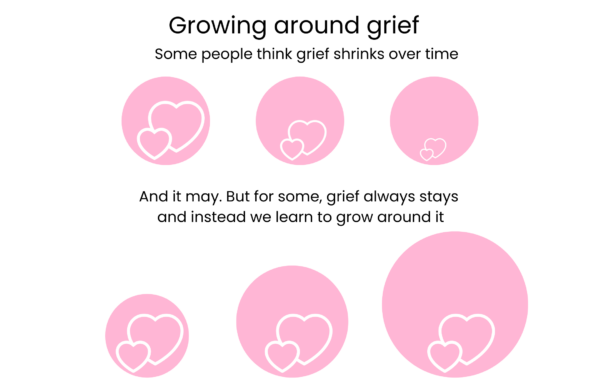Home | Support You | Support After Loss | Early Days

How do you get through it? Practical tips and emotional support.
We are simply not prepared to experience grief and it can feel like the ground has dropped from beneath our feet. It is understandable to be struggling with feelings of denial, shock and disbelief, or just feel numb. How could this happen, how can the world carry on turning?
Let go of any expectations of how grief should feel or how long it should take. Your grief is as personal and unique as you. Sometimes, you might need to take it minute by minute, hour by hour or day by day. How one person navigates grief can be completely different to another, but whatever you are feeling is likely to be normal – there is no right or wrong way to grieve. (You may look up the 5 stages of grief – ignore them, grief is not a linear process and they are unrealistic.)
Nominate a spokesperson: It can be helpful to nominate a friend and/or family member to who can tell others what has happened and give updates. When you are ready you can contact people individually. You can share as much or as little information as you want. Some people might ask for the details, if you don’t wish to share it is ok to simply say you don’t want to talk about it.
Emotional and physical feelings: Grief can impact your concentration and memory, sleep patterns, give you aches and pains and chronic exhaustion. It can be hard to function ‘normally’. You may feel anger, despair, numbness – all manner of feelings which we assure you are quite normal in grief.
You may be experiencing a very painful, raw grief and it does take time to move through, but in time this rawness fades. Please hold on to that hope. You will feel better. You will find a way to live your life and carry them in your heart.
Even though there is nothing you can do to stop feeling sad, you can choose to be kind and gentle to yourselves.
Before the funeral: We know that organising your baby or child’s funeral was something you never in a million years thought you’d have to do. You may never have organised a funeral before. Take time to consider what is important to you and your family.
Your funeral director is there to guide you, answer your questions and help create a ceremony that is right for you. It can be very difficult at this time to ask the right questions or remember everything you have been told. Consider having a friend of family member present when you are making these decisions.
You might want a special toy (you could spray a favourite scent), photograph of your family, poem or letter, to be placed with your baby or child in the coffin. Dry a flower as a keepsake.
Siblings: Children only need simple, age appropriate explanations as to what has happened. The baby or child you have lost is a member of their family and they will grow up with that knowledge. They may wish to put a toy, drawing, letter or something else with the baby. Give them the choice to be involved, whether or not they attend the funeral and explain what will happen. Sometimes children can benefit from the routine and ‘safe space’ that school provides so don’t feel you need to keep them off. If they are at school, let the teacher know what has happened so they can keep an eye on them and offer extra support.
More information on how children deal with grief and how to help them understand see our Siblings page.
If your milk comes in: Because nature continues doing what it should and your milk may come in, we have pinned a few articles on reducing your milk supply which might be helpful.
Support: Loss can isolate you. Find people to talk to – your ‘grief community’. Talk with others who truly understand and don’t feel uncomfortable with your loss, in person or online – connecting with people is comforting and healing.
Journaling can also give therapeutic benefits whether it is something you share or keep to yourself, putting thoughts and feelings into words can make our grief feel more manageable and help you process life after loss.
A little relief: One day, you may find you smile or laugh at something or just feel a bit brighter – then suddenly feel guilty. Please don’t. It just means your grief has given you a little respite. It is possible to enjoy things whilst being sad, some days will feel better than others, it is a very up and down process so don’t worry if sometimes you have a slump after a few days of feeling better.
It takes time: It may be a devastating loss that you are dealing with and it takes time to process. Grief can be exhausting in a way that sleep can’t fix, so don’t feel that you have to see people or go out if you don’t want to. Right now, you are caring for yourself on a deep level. Be gentle on yourselves and if all you did today was rest, that’s ok. That’s what you needed.
A new normal: There will come a time when it is not the first or last thing you think about each day. Take hope from that. Looking longer term, grief is not just about your loss, you will re-learn to live in a world that may be very different from the life you planned and hope for. Grief is not a race, there may be no finish line, no end to the journey. In time, there may be acceptance but not closure. Whilst grief itself is not unique – we all experience it – your grief and experience is as unique as you are.

Stopping grieving:
It is okay to stop grieving. It is okay if it doesn’t hurt anymore. You don’t have to feel guilty for not being in pain. Your healing does not invalidate how deep your wound once was. Your growth does not erase your love – Whitney Hanson
That doesn’t mean everyone will stop grieving, but if you do, that’s ok. Many people will always feel that sense of loss, even when the rawness of early grief has gone. But not everyone.